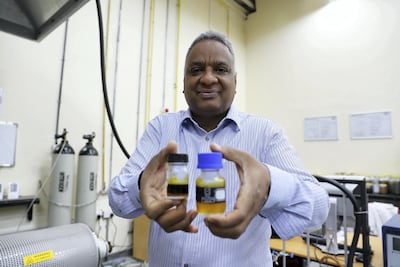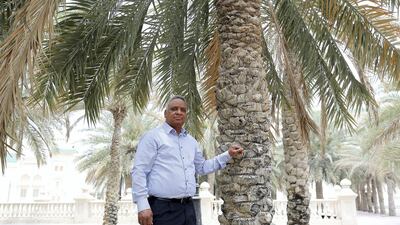Generations ago, date palms were not just a source of fruit. They were used to build boats, shelter, rope, fishing equipment and furniture, earning them a special place in Emirati heritage.
Now, scientists believe the waste produced by the trees – leaves, stems and empty branches – could prove a potent weapon in the battle against climate change.
Tests, carried out on plants from Sharjah at a world-leading research centre in the UK, have revealed that date palms make a promising biofuel, with potential uses including anything from powering cars and machinery to fertilising soil.
The investigation was the most comprehensive and sophisticated test of UAE date palms as a potential biofuel ever carried out, said Yassir Makkawi, associate professor in the chemical engineering department at the American University of Sharjah, who led the project.
“Date palms were used frequently in the past for building, for boats, for household items,” he said. “We are now reinventing it in a new way that will help the environment.
“During the past few years there have been very few studies on date palms and while they might look the same, their composition varies from one region to another. Our conclusion is that potentially UAE date palm is a good feedstock to convert into biofuels and biochar.
“We are converting waste into a high-value product. The process we have developed in our labs is suitable to take further to industrial, full scale production.”
The date palm waste analysed, at the European Bioenergy Research Centre in Birmingham, was collected in Sharjah, close to the American University of Sharjah campus.
Using a process known as fast pyrolysis, the material is converted to gas after being exposed to temperatures of more than 500 degrees. The gases are condensed to produce liquid oil, which is similar in quality to fossil fuels. The process also produces char, which can be used as a fertiliser.
The overall energy conversion efficiency, meaning the ratio of energy content in the date palms to that which could be used for fuel, was found to be 87 per cent, giving it a "high efficiency" categorisation.
There are other plants that are more efficient for use as a biofuel, Dr Makkawi said. However, an advantage of date palms is that they produce large amounts of waste naturally – up to 35kg per tree annually.
Rather than being burned or put into landfill, converting the waste to biofuel would make use of an existing resource.
Using waste from existing plants also means that what is seen as a downside of biofuels – that land is used to grow crops to produce energy rather than for food or other uses – would not be applicable as the date palms are already there.
“The beauty of this is we are converting a locally available waste, which has been causing environmental problems to get it disposed, to produce valuable products," Dr Makkawi said. “So we are killing two birds with one stone.

“In the UK, for example, they are growing energy crops and that competes with land for plants for food. Here in the UAE, we are using existing waste so we don’t have that problem.
“It also fits in with the UAE vision for waste minimisation and renewable energy. We all have an interest in reducing global warming by reducing Co2 emissions."
The results of the study have been revealed in a paper published in the Renewable Energy International Journal.
Biofuels are more environmentally friendly than fossil fuels because while burning them still releases carbon dioxide, growing the plants absorbs a comparable amount of the gas from the atmosphere, leading to natural cycle. Meanwhile, burning fossil fuels such as oil or gas extracted from the Earth means a new source of carbon is introduced into the environment.
Dr Makkawi, 53, who gained significant experience in biofuels research as an academic in the UK before moving to the UAE three years ago, is working on another project that would see the conversion process powered by solar energy.
This would counter another traditional problem with biofuels - that the amount of energy needed to create them has a negative environmental impact.
“With increased efficiency, and ongoing research like we are doing, we are going to minimise the cost and make biofuels more competitive with the fossil fuels," he said.
“If we are able to use solar energy, as we are planning to do in our next project, we will be able to break down the cost to really competitive rates and make the UAE leading in this kind of technology.”
He is also examining new ways of converting food waste, a particular problem in the Emirates, into biofuels.
Earlier this year, an Etihad flight between Abu Dhabi and Amsterdam became the UAE's first commercial air journey powered in part by biofuel generated from Abu Dhabi-grown plants nurtured on desert land, saltwater and seafood.

